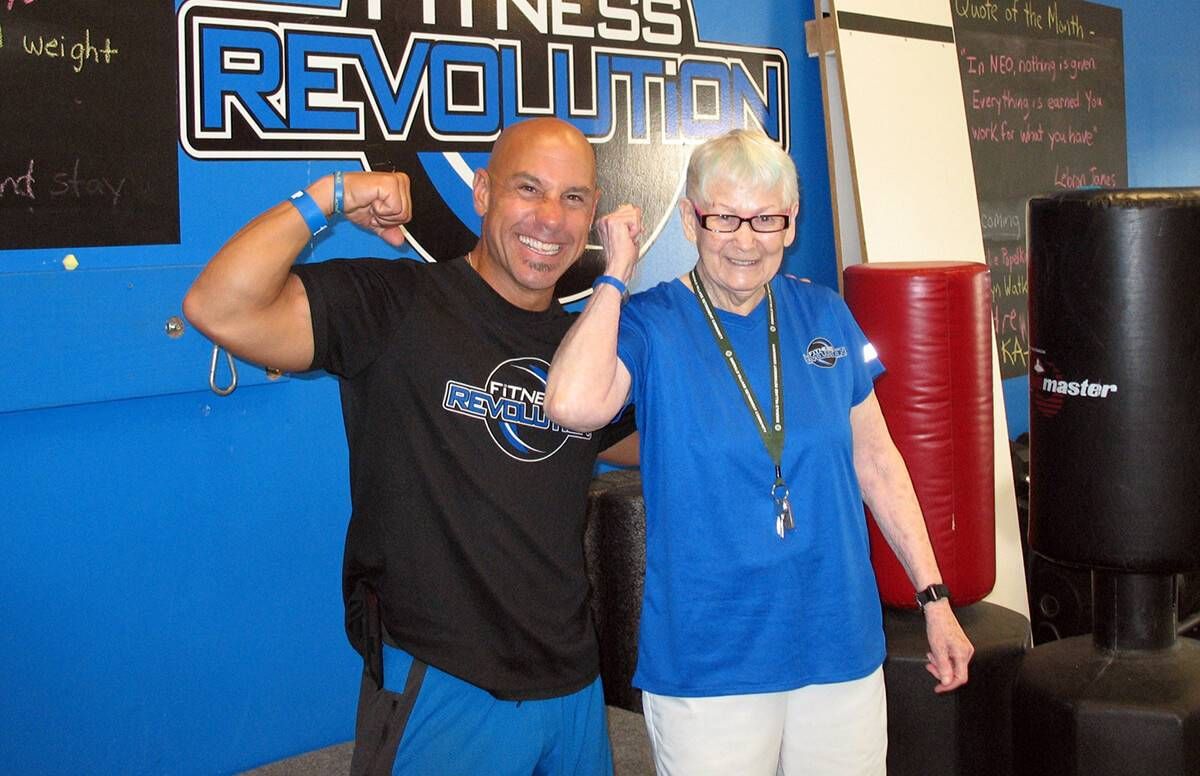91-Year-Old With Failing Mind Works Her Body
A dementia diagnosis has not stopped her from keeping active
It started when my mother uttered the six worst words an elderly parent must never say to an adult child: “I have something to tell you.”

My then-91-year-old mother, Mildred Burda, greeted me with those words when I stopped by to visit. Mom lives in a two-bedroom apartment in a “senior retirement community” where my parents moved five years ago.
“I decided to start running,” she said. After a moment I responded, “OK, Mom, I’ll bite. What do you mean you started running? Walking the stairs twice a day isn’t enough?”
“I’m bored and I just decided I needed to run,” my mother said. “I don’t run outside because the sidewalks are uneven. I leave my apartment and run down the hall. Then I walk down three flights of stairs and run down the hall to the dining room. People think I’m nuts.”
Good Habits Sustained, Despite Dementia
My parents were always active. And I mean always. Mom only stopped cross-country skiing at 80 after her bypass surgery. Dad continued until his final illness — he was 88. So, my mother telling me she started running should not have been surprising.
Except for one thing: My mom has vascular dementia resulting from ongoing transient ischemic attacks (TIAs). Her primary care physician encourages her to exercise because it’s good for her and she enjoys it. Plus, it has helped my mother with everyday tasks like getting in and out of the car without assistance and climbing stairs. And that allows her to maintain more independence.
Mom walks to church every day, regardless of weather. Not long ago, she asked for a cane — but not for the usual reasons. She wanted one because her sidewalk doesn't get cleared in the winter. It’s one of her pet peeves. She first started using a mop handle to find the sidewalk but decided a cane would be better. People don’t look at an “old lady” (her words) walking into church with a cane, “but they would if I came in with a mop handle,” Mom said.
Wanting More
After a few weeks, Mom mentioned she was still bored. I suggested working out with a personal trainer. She had done that before her bypass surgery. I talked to Dan Bednar, the co-owner of Cleveland Fitness Revolution in Westlake, Ohio, and my boot camp trainer. He agreed and arranged for my mom to come in for an assessment.
She walked into the studio and during the preliminary assessment, it became clear that my mother was, in Bednar’s words, “not a typical 90-year-old.” Bednar said Mom, whom he refers to by her nickname, Mur, was in better shape than some of his (much) younger clients.
Mom is Bednar’s oldest client and she’s been working out with him for over a year. He posted a video of her pulling a 60-pound prowler sled on Facebook with the caption, “She’s 90. What’s your excuse?”
Her primary care physician uses her example to shame younger patients who claim they can’t exercise. And my fellow boot camp attendees are impressed with her accomplishments — especially when it comes to planks.
‘Never Too Old’
Bednar said, “The ultimate truth is you are never too old to start working out.” He believes one benefit for people over 80 is “just quality of life.”
Bednar noted: “Mobility and quality of life are important factors as we age because we tend to lose it. What someone can do depends on age, fitness level and mental capacity.”
He believes walking can be a good place to start. Even people who use a walker can go from one end of the hall to the other. “More strength, better mobility and balance are a good thing,” Bednar said.
According to him, age alone is no reason to prevent someone from exercising. And a gym is not necessary; people can exercise in their room or in a chair, if necessary. Equipment can be as simple as light fitness bands or low-weight dumbbells. In a pinch, you can use soup cans.
But Bednar believes everyone should consult a fitness professional to establish a daily routine, and a professional consultation can address any concerns. He also recommends discussing an exercise program with your doctor before starting.
However, finding a qualified fitness professional can be a challenge because, as Bednar points out, anyone can call himself a “personal trainer.” Bednar recommends asking about the trainer’s background, experience and certifications. “An initial consultation is essential,” he said. “If one isn’t offered, find another trainer.”
Client of the Month
My mother’s regimen with Bednar is strength training, including load-bearing exercises. That helps her build up and maintain bone structure. Sometimes, her dementia interferes and prevents her from working out. But it does not stop her.
Encouragement is important. When Mom held a plank for 60 seconds, Bednar made her “client of the month” and awarded her a Fitness Revolution T-shirt. In December 2015, Mom held a plank for 85 seconds. Her goal for 2016 was to hold a plank for 90 seconds by her 92nd birthday.
Not everyone believes this is a good thing. Mom has run into opposition and some criticism from other residents because they think exercising at her age is “dangerous.” It seems the criticism is tinged with a smidge of envy.
‘Life Her Way’
My mother is at the end of her life and struggles on many different levels. But she is not giving up. Between the bright blue streak in her hair and her planking prowess, Mom is living life her way.
On Sept. 21, her 92nd birthday, Mom reached her goal: holding a plank for 100 seconds. Now she is thinking about her next goal.
My goal is trying to keep up with my mother. (BTW, I’m working on my plank.)

